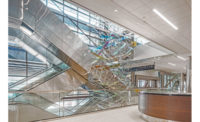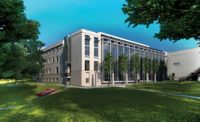Layton Construction Selected as 2016 Intermountain Contractor of the Year

Layton crews pour the footings above 11,000 ft for the now completed Summit Lodge on Hidden Peak at Snowbird Ski resort in Utah.
PHOTO COURTESY OF LAYTON CONSTRUCTION

Health care construction has been one of the most lucrative markets for Layton. Among the projects Layton has completed across the country for Tennessee-based IASIS Healthcare is the 28-bed Mountain Point Medical Center in Lehi, Utah.
PHOTO COURTESY OF LAYTON CONSTRUCTION


Layton Construction Co. CFO Dallis Christensen describes what life is like these days for the 63-year-old general contracting firm based in Sandy, Utah. “On the same day, we may be pouring concrete below sea level in Florida and also at 11,000 feet at the top of Snowbird ski resort,” he says.
That’s because Layton is no longer just a regional contractor. The firm’s expanded geography is part of a carefully mapped strategy that’s been in the works for years.
“We used to see ourselves as a Utah-based contractor with a Wasatch Front focus. That’s no longer the case,” says David Layton, president and CEO.
The company, which has nearly 1,000 employees and recently completed or is continuing work in 24 states, now has offices in Phoenix; Boise; Irvine and San Jose, Calif.; Orlando; Nashville; and in two cities in Hawaii.
The expansion is the result of strategic decisions made in the early 2000s, says Layton. “We decided to create strategic business units (SBUs) to align our services with the needs of a particular client, not just a project type,” he says. “We also decided we were willing to travel with those clients wherever they wanted us to provide services. Our offices outside Utah are the natural outgrowth of that. We are there to be closer to clients we have repeat business with.”
SBUs in the newer locations interact with those focused on a particular type of construction to generate and build business, says Alan Rindlisbacher, Layton’s director of corporate communications. For example, in recent years the company’s Nashville office, which is focused chiefly on health care clients, has also been courting work with a technology firm based in the city, he says.
“They didn’t have work [at that time], but our guys had gotten to know this company pretty well,” he says. “One day, our Arizona office gets a lead on a tenant improvement for the same tech company. They called Nashville and were able to find out more about the company and what they wanted, and the company knew us,” he says.
“We got that job and soon after that, the company was doing a job in San Mateo—and we have an office in San Jose—so we did that work for them. Now we’re building for them in Nashville and doing a major call center for them in Florida through our office in Orlando. All these groups interact with each other to create synergy and find opportunities,” he says.
That strategy has produced solid growth. Layton ended fiscal year 2015 with just over $1.1 billion in revenue nationwide, landing them at No. 57 on ENR’s 2016 ranking of the top 400 general contractors in the U.S. Layton officials say that the majority of projects were delivered with CM-GC or design-build contracts. The company also reported regional contracting revenue of $412.7 million for 2015, up from $282.2 million the previous year.
For its strong revenue growth and innovative management strategy, ENR editors have named Layton Construction the 2016 Intermountain Contractor of the Year.
A Sure Thing
The firm’s recent trajectory shows how dramatically the construction business has changed. “There’s not an easy project out there any more,” Layton says. “There’s not a project any more that doesn’t have a compressed schedule, aggressive budget expectations and demands for high-quality and sustainable construction practices.”
He says the company has tried to eliminate uncertainty in projects, whether it’s for a sophisticated owner that builds multiple projects or a first-time client.
“We have clients who have not built before and want to tap into our experience and systems to give them a sense of confidence going forward,” Layton says. “We have some who have huge programs and are building all over the country, and they know where they are headed and where the challenges are, and they look to us to mitigate or eliminate those challenges.”
Tom Ford is director of corporate facilities for the Rocky Mountain region of motor manufacturer Cummins. The company has hired Layton for multiple projects within the region and across the country.
“I’ve built three projects with Layton since 2000—in Boise, Denver and Las Vegas—and they’ve done remodels at other locations for us. They have all been different, but Layton has offered a complete package,” Ford says. “They will do a lot of things during preconstruction and have helped with design and development. They are good at coming up with cost estimates I can take to management and even some things I don’t have to ask for. They are a good resource for us.”
Ford says that Layton became a “preferred vendor” for Cummins last year.
Steve Bowers, Layton executive vice president, says building relationships and doing work “up front” is key to successful and repeat projects.
“The clients want that predicable outcome. That takes a tremendous amount of time at the front end,” Bowers says. “You have to get into their world to deliver that outcome. If you do that right, they come back because they don’t want to take a chance with someone else.”
After watching Layton build nearby Herriman High School, the city of Herriman selected the firm to construct a new city hall and adjacent park facility.
As infrequent builders of major projects, the city held many meetings before and after the bid process to ensure a quality outcome, says City Manager Tom Wood.
“They [Layton] did a lot of preconstruction work, and we went to several other facilities to see what might and might not work for us,” he says. “With projects like this, people want something nice, but they also want you to watch the tax dollars.”
Healthy Market
Health care construction has been a significant revenue driver for Layton over the past 10 years. In 2015 that market accounted for $387.8 million in revenue, up from $233.5 million in 2014.
That same year the company completed work on a 1.2-million-sq-ft expansion of University Hospital in San Antonio. The four-year project was a $615-million joint venture with Houston-based Vaughn Construction and San Antonio-based Zachary Construction, known jointly as ZBL Construction.
Recently, Layton completed a 200,000-sq-ft, $160-million addition to the Kapiolani Medical Center in Honolulu.
This spring, to gain a greater foothold in the lucrative health care market in the San Francisco Bay Area, Layton purchased Fernandes & Sons Construction of Campbell, Calif., a 60-year-old company with a history of health care work.
Closer to home, this summer Layton completed Mountain Point Medical Center in Draper, Utah, and a new cancer treatment center at Jordan Valley Medical Center. The two projects are the latest for Franklin, Tenn.-based IASIS Healthcare. Led by Mike McDonough, Layton vice president, the company has solidified relationships with IASIS and is working on renovations and expansions of its facilities in Utah and elsewhere.
Joey Abney, vice president of design and construction and plant operations, says IASIS began working with Layton on projects in Utah in 2003.
“I knew Mike [McDonough] from previous projects in my career,” says Abney. “In our business, you need to have people who understand how hospitals work. Especially with renovations, you have to have people who can conduct themselves appropriately in an atmosphere where care is being provided, and Layton has a wealth of folks who understand that.”
Growing Diversity
Beyond health care, the Layton portfolio includes projects in hospitality, retail, commercial offices and the religious and cultural sectors.
Currently, Layton is putting the finishing touches on a new Broadway-style theater in downtown Salt Lake City (ENR Mountain States, 6/23/14, p. MS49) as well as a theater in Sandy, south of Salt Lake City, for the Orem-based Hale Center Foundation.
It has high-end resort projects underway in Hawaii, Arizona and Southern California as well as correctional facilities in California and a new temple in Hartford, Conn., for the Church of Jesus Christ of Latter-day Saints.
Christensen says developing expertise in certain sectors took time but has paid off. “We might have a client who we’ve built a retail location for, but then they might need a new manufacturing facility and a warehouse or a corporate office, and we have specialty teams who can take on that work and run with it,” he says.
“We are committed to growing the company but not just for the sake of growth,” says Layton. “Our growth has been a direct result of serving the needs of our clients and growing with them. Ultimately, we want to be a company that can employ good people long term and where people can progress in a career. Continuing to serve our clients and deliver for them will ensure we can do that.”






